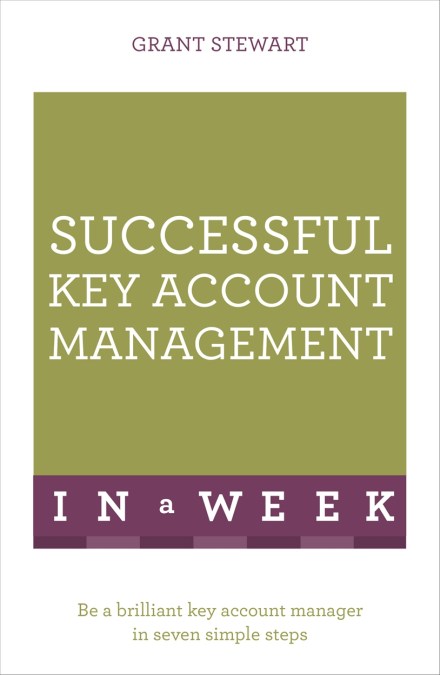Successful Key Account Management In A Week
On sale
7th January 2016
Price: £10.99
Selected:
Paperback / ISBN-13: 9781473608542
Key account management just got easier
‘This little book is a real gem’ Professor Malcolm McDonald
Key account management is increasingly important and must keep pace with its customers as they continually develop and evolve, often resulting in increasingly sophisticated buying structures. The key account manager therefore requires a wide variety of skills in order to be successful; this is not only an important job role in its own right, it is often a stepping stone to career development, leading to more senior management jobs.
Successful Key Account Management In A Week is a week long course. On Sunday you are encouraged to Know your customer as success depends on a relationship that is both rewarding and valuable. On Monday you will Analyse your growth opportunities. The competitiveness of the company must be appraised to enable the identification of sales growth opportunities and all major accounts should be compared in appeal and position to give an indication of the strategy to be adopted for customers. On Tuesday you will Measure profits by account. You will be shown how to measure the profitability of major customers and to draw up league tables to enable profit improvement strategies. On Wednesday you will Plan for success, building on the analysis of growth opportunities and profit measurement already considered, to result in a best judgement final plan. On Thursday you will learn to Negotiate to win-win; success relies on understanding the difference between negotiation and selling and being able to conduct negotiations to produce a win-win situation in which the objectives of both sides are considered. On Friday you will look at Control activity levels and the monitoring of standards of performance to enable the presentation of plans and progress, allowing the measurement of success against these plans. And finally, on Saturday you are reminded to Manage relationships with an introduction to the Relationship Model which describes how business with a customer changes as it moves from a transactional or short-term sales achievement, to collaboration with long-term customer value and retention.
‘This little book is a real gem, which you should read, use and keep handy for continuous reference. If you follow the straightforward guidelines in this book, your company’s future is assured’ Professor Malcolm McDonald, Former Professor of Marketing and Deputy Director, Cranfield University School of Management
‘This little book is a real gem’ Professor Malcolm McDonald
Key account management is increasingly important and must keep pace with its customers as they continually develop and evolve, often resulting in increasingly sophisticated buying structures. The key account manager therefore requires a wide variety of skills in order to be successful; this is not only an important job role in its own right, it is often a stepping stone to career development, leading to more senior management jobs.
Successful Key Account Management In A Week is a week long course. On Sunday you are encouraged to Know your customer as success depends on a relationship that is both rewarding and valuable. On Monday you will Analyse your growth opportunities. The competitiveness of the company must be appraised to enable the identification of sales growth opportunities and all major accounts should be compared in appeal and position to give an indication of the strategy to be adopted for customers. On Tuesday you will Measure profits by account. You will be shown how to measure the profitability of major customers and to draw up league tables to enable profit improvement strategies. On Wednesday you will Plan for success, building on the analysis of growth opportunities and profit measurement already considered, to result in a best judgement final plan. On Thursday you will learn to Negotiate to win-win; success relies on understanding the difference between negotiation and selling and being able to conduct negotiations to produce a win-win situation in which the objectives of both sides are considered. On Friday you will look at Control activity levels and the monitoring of standards of performance to enable the presentation of plans and progress, allowing the measurement of success against these plans. And finally, on Saturday you are reminded to Manage relationships with an introduction to the Relationship Model which describes how business with a customer changes as it moves from a transactional or short-term sales achievement, to collaboration with long-term customer value and retention.
‘This little book is a real gem, which you should read, use and keep handy for continuous reference. If you follow the straightforward guidelines in this book, your company’s future is assured’ Professor Malcolm McDonald, Former Professor of Marketing and Deputy Director, Cranfield University School of Management
Newsletter Signup
By clicking ‘Sign Up,’ I acknowledge that I have read and agree to Hachette Book Group’s Privacy Policy and Terms of Use
Reviews
Anything from Grant Stewart is bound to be of high quality, given his background, experience and wisdom. So it is of no surprise to me that this little book is a real gem, which you should read, use and keep handy for continuous reference. The days have long gone when a traditional sales approach was sufficient for major accounts. Given the electronic availability of data, companies know instantly, for example, what products are available to them worldwide and at what price, so the most likely source of differential advantage will come from in depth supplier relationships that enable them to avoid costs, reduce costs, or add value in some way. The only way this can be done by a supplier is by knowing as much, if not more, about the customers' business than they know about their own. Only then does a supplier have a chance of developing a relationship, which will not only help the customer to avoid disadvantage (let's be clear that any supplier can do this), but to create advantage for the customer. If you follow the straightforward guidelines in this book, your company's future is assured.

